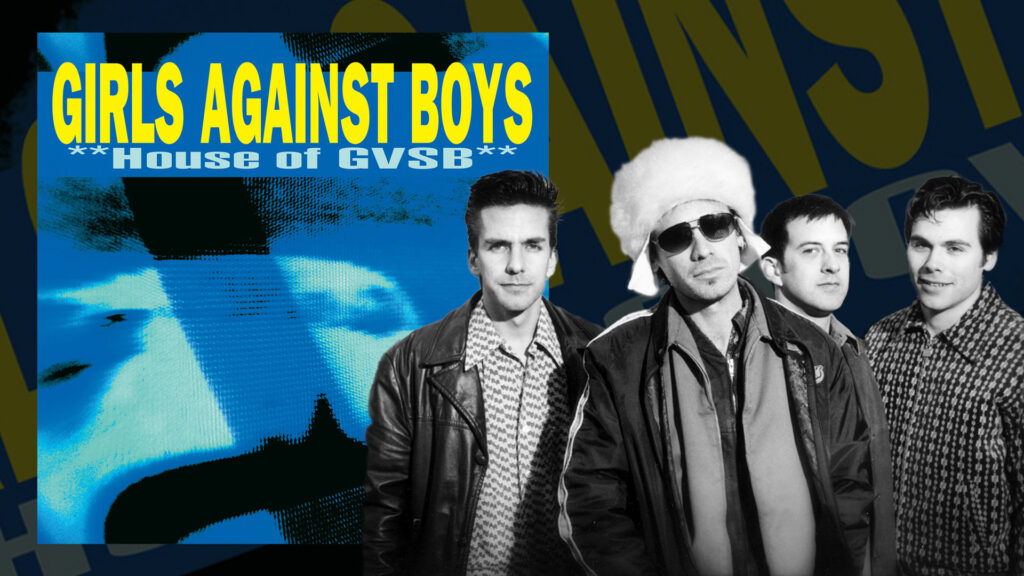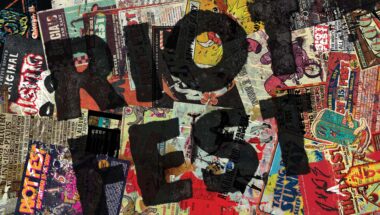The 90s alternative rock boom produced a lot of surprising success stories. For instance, post-hardcore outfit Girls Against Boys, which was born out of the DC Dischord scene before landing on MTV, Kevin Smith soundtracks, and (in poster form) Meadow Soprano’s bedroom wall. It was a strange rock star moment from a band whose shadow-y insomniac anxiety and luxurious grooves stood in stark contrast to the grunge bands they were surrounded by. Their 1996 album House of GVSB was one of the peaks of the 90s post-hardcore sound, and one of the most singular rock albums to come out of the era.
After a COVID-related delay earlier this year, the band’s hitting the road to belatedly celebrate the LP’s 25th anniversary. Ahead of their Metro show in Chicago this Wednesday (grab tickets here), We emailed frontman Scott McCloud for his take on the album and a unique perspective on the post-Nevermind gold rush.
How did all of you guys coming out of hardcore shape the direction of Girls Against Boys, both sonically and in how you approached making music, your career, et cetera?
Playing loosely with my terms here, I think what we appreciated in hardcore music (like Minor Threat, Bad Brains, or Black Flag) was the visceral energy and raw minimalism. And particularly in the DIY nature of the DC/Dischord scene we grew up in. That said we were always more of a “post-hardcore” leaning band, from Soulside into GVSB. Playing fast was quickly less of a thrill for us than a noisy groove or tensions in the atmosphere—but the basic essential idea of a band of individuals coming together to create something that sounded fresh to our ears I think shares an impulse from hardcore.
The idea of “professionalism” in music (like doing instrumental solos) wasn’t a part of our ideology. But those tendencies were also indoctrinated simply by how music was made and recorded back then. Studio time was expensive so recording in and of itself was more of just a better-than-boom-box sounding recording of what the band was doing. Nowadays recording music is a completely different animal. People often have multiple ideas in one song, due to the nature of the ease of that as anyone with a laptop basically has an 80s-style recording studio at their fingertips. I always think the bare minimalism, limitations, and economy of recording had a lot to do with the stylistic choices bands made in the 80s/90s.
There’s been a been a big flourishing of hardcore recently, with a lot of bands stretching the genre’s boundaries in ways that feel similar to what GVSB/Soulside were doing back in the day. Have you been paying attention to any of that? Do you feel any connection with the scene these days?
Funny, a few years ago my mother (80 years old) wrote me saying she’d heard a band that “sounds so much like GVSB,” she said, on an NPR program. The band she was referring to was Idles. I hadn’t heard anything about them at that point—and for a person like me the shades of post-hardcore sounds is a very broad spectrum. So personally, I may not think Idles and GVSB actually sound similar, but I could immediately identify a feeling that their music was coming from; at least a similar ideology about making music. It’s that same sense of abandon in a pummeling noise groove. Less attention to melodic singing. More attention to emotive vocalizing, wordplay. And it interested me greatly that a band like Idles was making waves because so much of that kind of style of music making had gotten ironed out over the years.
Again, in the main period of Girls Against Boys there seemed to be almost a fiscal imperative to attempt to smooth out the scronk [sic] edges. To tame oneself or dumb down ideas to fit into the very tight vernacular of 90s modern rock radio. A whole radio format which no longer even exists—which was in some ways the legacy of Nirvana and grunge, a gravy train MTV rode until it became clear that dumb reality shows were more economically viable, and more insidious. So I’d say I’m certainly not an expert on scenes anymore. But I can tell when a band, no matter what style of music, seems to be invigorated by similar ideas to our own.
What’s it like to be revisiting House of GVSB for this tour? Do you feel like you engage with those songs in a different way than you did when they were first written?
I feel like the songs are so much a part of who I am that there have been times when we get together that I don’t even listen to the records in preparation. But this time is different, as we spent a good 2 years at least discussing with Touch & Go the House reissue. As it’s a double vinyl, this also involved lots of going back, digging up old tapes, finding out what the hell was on them. That process provides a bit more mental time travel. In a way, the second disk of singles comp tracks was even more enlightening than digging back into the LP itself. I was actually proud to hear in so much of the music, the actual quite strong attitude we had.
We were pretty deep into [the] band space of anything goes by the time of House. House was a solid affirmation of having emerged from within ourselves into what I think is a distinctive sound of our own. Sure, with obvious influences of which we were proud. But it felt and still does, for me anyway, the height or zenith of what we’d been steadfastly on the trail of for years. What is honestly remarkable to me is the lasting effects that these ideas and the making of the songs had on me. It’s not nostalgic for me at all. Yes, I’m older. But the ideas in the songs musically and lyrically matter as much to me now as they ever did.
That also goes back to the first question. The ideas ingrained from Dischord or DIY. Sing about something that really matters to you as opposed to showing off or trivializing your output by overindulgence. Music lasts longer stripped to its bare and rare essence. Recording “limitations” are strengthening by virtue of sticking to the essential aspects. Keep your noodling to a minimum. Capture the sound sparingly. Bob Weston (Shellac) pulled the whole project together in mastering, and it’s clearly worth mentioning Ted Niceley and Eli by the period of House were a well-oiled producer/engineer team in bringing all this stuff truly to life on tape.
House of GVSB put the band on the radars of a lot of people outside the indie/hardcore scene, and led to you getting swept up in the 90s alternative rock boom. What was it like going from a heavily DIY scene to the major label world? Do you feel any differently about it now than you did at the time?
It was very strange, exhilarating, and terrifying at the same time. I remember clearly the shift in the audiences. Long lines of more “fashionable” people, women in high heels. I’d always had a bit of trepidation about performing (usually solved by a few stage fright beers). But this was different. Much bigger shows.
For some reason a weekend of shows in France comes to mind. We’d played a very popular television show in Paris (excruciating for me) and we had a show in Lille the next day and it was like a Tuesday or something, so I thought, “OK this should be pretty mellow and fun.” But coming out from backstage just to check out an opening band, I was literally swamped with fans and saw at least 1,000 people out there. Stunned, I ran backstage thinking, what the fuck? But so much of this had been brewing throughout the few previous years. And the music press (especially in the UK but France too) had labeled GVSB “the sexiest band in the world.” And when you have masses of people idly flipping through magazines and seeing these things there is a sense of it going exponential (at least from our point of view).
Interestingly, I remember in interviews pushing back about what I thought was a bit arbitrary pigeonholing, as even then I recognized that coverage like that was a kiss and a curse. On one hand, you’re very happy so many people are discovering your music—something you’ve always dreamed of—but you’re also panicked about somehow everyone seeming to have gotten the wrong impression. Or at least a simplification and dumbed down version. I remember trying to steer interviews into more comfortable musical territory but no one was really, ironically, as much interested in the music as much as the fast eclipsing “image.” Pushing back was futile at a certain point, and started to feel petty to even try to push back. Time for the band photo for whatever magazine! Off to Pigalle! Or Amsterdam’s red light district. Anything with SEX! In my view almost all music has a sexual pretext. Subtext? Some kind of text? I never particularly felt GVSB music had anything more sexualized about it than most other music.
I coincidentally started revisiting House of GVSB (and Venus Luxure) a couple of weeks before getting this assignment, and the nocturnal, anxious vibe I get from the music fits really well with the mood of the current moment. What do you think those songs from 25 years ago have to say about 2022?
Interesting. I’ve probably already touched on it. In my view, good rock music or even any kind of music, has some tension and therefore some sort of character of at least quiet menace. Something hidden. Indeed something concealed rather than revealed. I’d even say people’s secrets might be more fascinating than really anything they might want to reveal. And within that is a large dose of fear in general.
I thought NYC was the best place ever to live in the 90s (I lived there much longer [than that]). But there were multiple things which drew me to New York and fascinated me. The almost constant fear of violence in the 90s NYC plays into our music. But alternatively the thrill and near vertigo of living in a sort of mass anonymous zone of almost pure selfishness and a desire to get ahead, or “survive” was fascinating too. No one would ever really know what you got up to. You could change yourself into whomever you wanted to be. And things, especially a human being, ought to live in a world where reinvention is possible. The person I was, and am, is ever changing. But the threads are there and I know them without having to look or even think. And in NYC, like all the cities in the world, your steps are erased by zillions of trampling feet, bubble gum, vomit on the streets, piss stains, trams and undergrounds, until, as you were always meant to be, you’re just a vague wonderful memory in fewer and fewer very beautiful minds until you finally disappear forever.
You can see Girls Against Boys with FACS and the Poison Arrows on Wednesday, October 12 at Metro. 3730 N Clark St. 18+, 7:00 p.m.; get tickets here.


